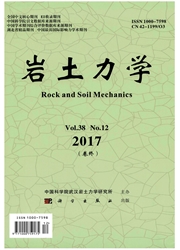

 中文摘要:
中文摘要:
针对矿产资源深部开采以及核废料处置等重大工程实际需求,对温度-应力耦合作用下岩石变形、强度的理论和试验进行研究具有十分重要的意义。通过试验研究了不同温度影响下砂岩的变形破坏特性,发现对于小尺度下的砂岩试件,当温度从室温升到150℃,抗拉强度有所升高;而温度由150℃升高到300℃,抗拉强度又有所下降,这是以往研究中没有观察到的现象,详细分析了其原因。并通过比较宏观断口位置图和名义应力-应变曲线,认为温度对砂岩的局部变形破坏机制有明显的影响。随着温度升高,断裂机制呈现脆性机制向延性机制转变的趋势。
 英文摘要:
英文摘要:
It becomes more and more important to study and understand the deformation and strength properties of rocks to meet the increasing demands of deep mining and nuclear waste disposal.The paper mainly studied different temperature effects on deformation and failure characteristics of sandstone through meso-experiment.Experimental results indicated that the tensile strength increased with the temperature increment from 25 ℃ to 15 0 ℃,and decreased with the temperature increment from 150℃ to 30 0℃.The similar phenomenon has not been reported in the previous literatures.Also it differs with the most macroscopic experimental results.The paper analyzed the possible reasons in detail.Also the experimental results of macroscopic fracture map and nominal stress-strain curves indicated that the temperature had a strong influence on the deformation mechanism of sandstone.The fracture mechanism had the tendency which transforms from brittle fracture mechanism in low temperature to ductile fracture mechanism in high temperature.
 同期刊论文项目
同期刊论文项目
 同项目期刊论文
同项目期刊论文
 SEM in situ investigation on thermal cracking behaviour of Pingdingshan sandstone at elevated temper
SEM in situ investigation on thermal cracking behaviour of Pingdingshan sandstone at elevated temper Rock Dynamic Fracture Toughness Tested with Holed-Cracked Flattened Brazilian Discs Diametrically Im
Rock Dynamic Fracture Toughness Tested with Holed-Cracked Flattened Brazilian Discs Diametrically Im CHARACTERIZATION OF SURFACE RUPTURE AND STRUCTURAL DAMAGE IN HONGKOU TOWN DURING WENCHUAN EARTHQUAKE
CHARACTERIZATION OF SURFACE RUPTURE AND STRUCTURAL DAMAGE IN HONGKOU TOWN DURING WENCHUAN EARTHQUAKE 期刊信息
期刊信息
